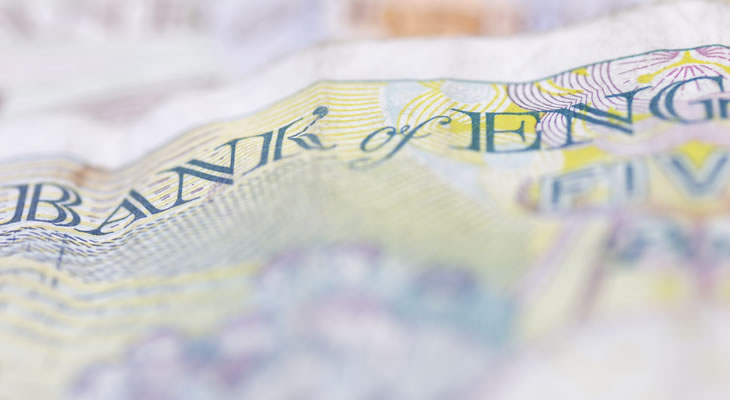The Pound Euro exchange rate failed to find any footing for an advance today, as Britain’s latest inflation stats fell short of expectations. However, weaker than forecast German growth limited its gains.
GBP EUR began the week trending at around 1.1002 and continued to trend near that level today, despite briefly touching a high of 1.1038.
Pound (GBP) Outlook Limited as Bank of England (BoE) Bets Remain Soft
Investors still lack any real reason to buy the Pound or expect any shift in tone from the Bank of England (BoE), as Britain’s latest Consumer Price Index (CPI) report fell short of forecasts.
UK inflation was forecast to improve from 2.6% to 2.7% year-on-year in July, but remain at 0% month-on-month.
The results came in at 2.6% and a contraction of -0.1% respectively, indicating that inflation was still weaker than expected.
The Office for National Statistics (ONS), which compiled the report, noted that while clothes, utilities and food continued to rise, motor fuel prices were falling. June house prices also grew at their slowest rate since March.
Due to the weaker inflation data, markets expect the Bank of England will easily be able to defend keeping its monetary policy frozen for an extended period of time.
Analysts noted that while the 2.6% figure is well above the BoE’s 2% target, the figure being weaker than expected leaves the bank with less pressure to tighten monetary policy.
Still, there’s plenty more data to influence the Pound outlook in the coming days.
Wednesday will see the publication of Britain’s latest job market results, including June’s job change and unemployment rate figures, as well as wage growth data.
Wage growth could be highly influential, as the BoE has noted wage growth as one of its biggest concerns for Britain’s economic outlook. If wages beat expectations, the Pound will see stronger demand.
Euro (EUR) Held Back by Underwhelming German Growth
The Euro was unable to capitalise on the weak Pound on Tuesday, as Germany’s latest Gross Domestic Product (GDP) report fell short of forecasts.
Analysts forecast German growth would come in at 1.9% year-on-year and 0.7% quarter-on-quarter.
While yearly growth beat expectations and came in at 2.1%, this was largely because the previous figure was revised higher from 1.7% to 2%.
Quarterly growth unexpectedly slowed to 0.6%, though the previous figure was revised higher to 0.7%.
This data slightly weighed on market hopes that the Eurozone would support tighter monetary policy from the European Central Bank (ECB).
While analysts remain optimistic on Germany’s economic outlook, the shared currency trended limply following the report.
The Euro could see further shifts in movement in the coming days depending on upcoming data.
The latest Italian and Eurozone Gross Domestic Product (GDP) projections will be published tomorrow. If Eurozone growth looks to come in lower than expected, this could put additional pressure on the Euro.
Thursday will follow with the Eurozone’s final July inflation results, which could definitely affect European Central Bank (ECB) speculation if the result surprises traders.
GBP EUR Interbank Rate
At the time of writing this article, the Pound Euro exchange rate trended in the region of 1.0985. The Euro to Pound exchange rate traded at around 0.9105.


Comments are closed.